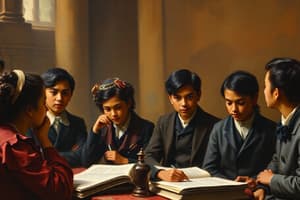Podcast
Questions and Answers
What was Rizal primarily arrested for?
What was Rizal primarily arrested for?
- Stealing government funds
- Writing against the Spanish colonial regime (correct)
- Criticizing religious practices
- Organizing a rebellion
Which of these was NOT a consequence of Rizal's execution?
Which of these was NOT a consequence of Rizal's execution?
- Increased calls for independence
- Growing support for revolutionary movements
- The immediate end of Spanish rule in the Philippines (correct)
- The rise of Rizal as a national hero
What was the main reason behind the controversy surrounding Rizal's trial?
What was the main reason behind the controversy surrounding Rizal's trial?
- Inconsistencies in the legal proceedings
- The nature of the charges against him (correct)
- Discrepancies in witness testimonies
- Insufficient evidence against him
What role did Rizal's writings play in the fight for Philippine independence?
What role did Rizal's writings play in the fight for Philippine independence?
Which of these is NOT a way Rizal's legacy continues to impact the Philippines?
Which of these is NOT a way Rizal's legacy continues to impact the Philippines?
What is the birth date of José Rizal?
What is the birth date of José Rizal?
Which of the following countries was NOT part of Rizal's travels in Europe?
Which of the following countries was NOT part of Rizal's travels in Europe?
What subject did Rizal NOT demonstrate mastery in during his early education?
What subject did Rizal NOT demonstrate mastery in during his early education?
Which of the following themes is explored in Rizal's novel 'Noli Me Tangere'?
Which of the following themes is explored in Rizal's novel 'Noli Me Tangere'?
What was the purpose of Rizal's writings while in Europe?
What was the purpose of Rizal's writings while in Europe?
What was the significance of the novels 'Noli Me Tangere' and 'El Filibusterismo'?
What was the significance of the novels 'Noli Me Tangere' and 'El Filibusterismo'?
José Rizal's parents played a significant role in his education. Which parent was noted for being well-educated?
José Rizal's parents played a significant role in his education. Which parent was noted for being well-educated?
In which city did Rizal primarily receive his early education?
In which city did Rizal primarily receive his early education?
Flashcards
José Rizal
José Rizal
Filipino nationalist and author, pivotal in Philippine independence.
Noli Me Tangere
Noli Me Tangere
Rizal's influential novel highlighting Philippine societal issues.
El Filibusterismo
El Filibusterismo
Rizal's sequel novel focusing on corruption and rebellion.
Rizal's European Years
Rizal's European Years
Signup and view all the flashcards
Rizal's Early Education
Rizal's Early Education
Signup and view all the flashcards
Themes in Rizal's Works
Themes in Rizal's Works
Signup and view all the flashcards
Impact of Rizal's Writings
Impact of Rizal's Writings
Signup and view all the flashcards
Rizal's Family Background
Rizal's Family Background
Signup and view all the flashcards
Rizal's influence
Rizal's influence
Signup and view all the flashcards
Political activism
Political activism
Signup and view all the flashcards
Trial and execution
Trial and execution
Signup and view all the flashcards
Rizal's legacy
Rizal's legacy
Signup and view all the flashcards
Study Notes
Early Life and Education
- José Rizal was born on December 21, 1861, in Calamba, Laguna, Philippines.
- His family was of mixed Chinese and Spanish descent.
- Rizal's father, Francisco Mercado, worked as a land surveyor and his mother, Teodora Alonzo, was well-educated and deeply religious.
- Rizal's parents were instrumental in his early education.
- He received his early education largely at home.
- He later attended schools in Manila and began an extended stay in Europe around 1882.
- Rizal excelled in academics demonstrating a profound thirst for knowledge.
- He displayed a mastery of multiple subjects from an early age.
European Years and Activism
- Rizal went to Europe in 1882; from there he traveled extensively through European capitals such as Spain, France, Germany, and Italy.
- This extensive travel provided diverse experiences in areas like education, culture, and politics.
- He observed European political realities and social conditions.
- He published numerous writings, including novels and articles, during this period.
- His writings reflected his opinions on Philippine society, colonial oppression, and the need for reform.
- His famous works, "Noli Me Tangere" and "El Filibusterismo," were written and published during this time.
- The novels, though fictional, detailed the injustices and problems in the Philippines under Spanish colonial rule.
- These novels gained popularity in the Philippines and significantly impacted Filipino society.
- Rizal's works exposed widespread corruption, inequality, and mistreatment by Spanish officials.
Key Works and Literary Impact
- "Noli Me Tangere" (Touch Me Not) was a highly influential novel. It explored the historical, social, political and religious issues in the Philippines under Spanish colonial rule. It highlighted the injustice and abuse faced by Filipinos and included themes of societal corruption, clergy abuses, and the need for change.
- "El Filibusterismo" (The Subversion/The Reign of Greed) was Rizal's second novel, continuing the story of Crisostomo Ibarra from "Noli Me Tangere", to explore the intricacies of Filipino society and the difficulties the nation encountered.
- His works inspired nationalist sentiment and served as motivation for Filipinos seeking independence.
- Rizal's literary works remain influential and are fundamental texts in Philippine literature and history.
Political Advocacy and Arrest
- Rizal's writings and actions fueled the call for reforms of the Spanish colonial system in the Philippines.
- Rizal actively participated in movements to improve the lives of the Filipino people.
- His involvement addressed various social issues within the colony.
- He supported the movement for national ideals.
- His letters and articles shaped public opinion and inspired political activism.
- Rizal was arrested and imprisoned multiple times, facing accusations of subversion due to his writing.
- His imprisonment resulted from his involvement with political revolutionaries aiming for independence.
Trial and Execution
- Rizal’s trial was highly publicized.
- Accounts of the trial and related events garnered significant media attention locally and internationally.
- The trial generated controversy due to the nature of the charges.
- He was found guilty of sedition and rebellion.
- He faced execution in Bagumbayan (now Luneta) on December 30, 1896.
- He was executed by firing squad at the young age of 35.
- Rizal's death marked a significant turning point.
- His martyrdom became a driving force for the revolution.
Rizal's Legacy
- Rizal's sacrifice and martyrdom became a powerful symbol of resistance and self-determination among Filipinos.
- His ideas and writings remain critical to Philippine nationalism.
- His influence on Filipino identity and culture is immense.
- "Noli Me Tangere" and "El Filibusterismo" are essential texts in Filipino literature, frequently studied.
- He is a pivotal figure in the Filipino struggle for freedom.
- Rizal's legacy extends beyond literature, impacting Philippine politics, education, and society as a whole.
Studying That Suits You
Use AI to generate personalized quizzes and flashcards to suit your learning preferences.




